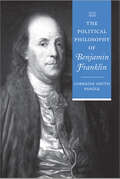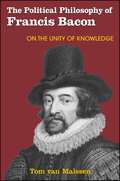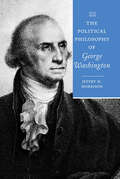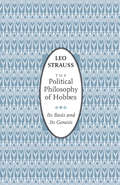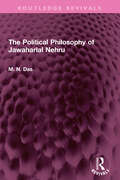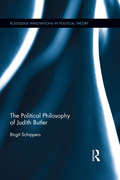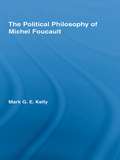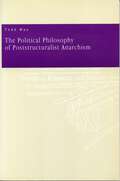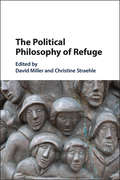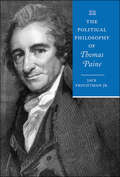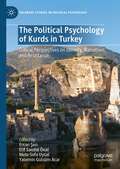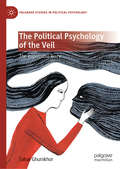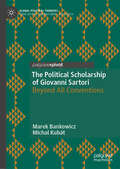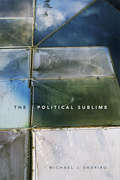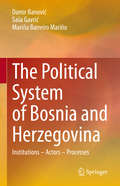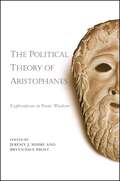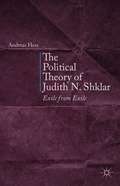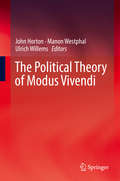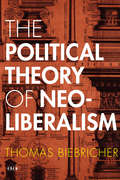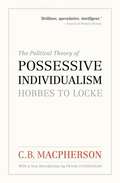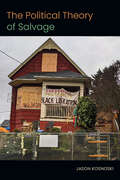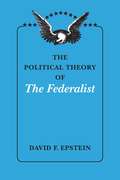- Table View
- List View
The Political Philosophy of Benjamin Franklin (The Political Philosophy of the American Founders)
by Lorraine Smith Pangle“One of the very finest introductions to this remarkable American’s thought.” —Ralph Ketcham, Claremont Review of BooksHe invented the wood-burning stove and the lightning rod, he wrote Poor Richard’s Almanac and The Way to Wealth, and he traveled the world as a diplomat. But it was in politics that Benjamin Franklin made his greatest impact.Franklin’s political writings are full of fascinating reflections on human nature, on the character of good leadership, and on why government is such a messy and problematic business. Drawing together threads in Franklin’s writings, Lorraine Smith Pangle illuminates his thoughts on citizenship, federalism, constitutional government, the role of civil associations, and religious freedom.Of the American Founders, Franklin had an unrivaled understanding of the individual human soul. At the heart of his political vision is a view of democratic citizenship, a rich understanding of the qualities of the heart and mind necessary to support liberty and sustain happiness. This concise introduction reflects Franklin’s valuable insight into political issues that continue to be relevant today.
The Political Philosophy of Francis Bacon: On the Unity of Knowledge
by Tom van MalssenComprehensive in its ambitions and meticulous in its approach, The Political Philosophy of Francis Bacon is a new and unique interpretation of one of early modernity's more important thinkers. Whereas recent works on Bacon tend to confine themselves either to interpreting his historical context or to considering the founder of Baconianism from the perspective of one work in particular or the history of science in general, Tom van Malssen argues, through detailed and provocative interpretations of a number of Baconian writings, that the unity of Bacon's thought can only be revealed if these writings are read in historical and philosophical conjunction as well as on the assumption that they are all somehow part of the whole of Bacon's political philosophy. In addition to restoring Bacon to the pantheon of great philosophers, Van Malssen demonstrates that a proper understanding of Bacon's political philosophy contributes significantly to our understanding of the nature of philanthropic science, the modern project, and ultimately ourselves.
The Political Philosophy of George Washington (The Political Philosophy of the American Founders)
by Jeffry H. Morrison&“A delight . . . rewarding insight into Washington and his times . . . and an illuminating section on the religious outlook of this American founder.&” —Journal of American History George Washington is revered as the father of his country, a clever and skilled general, and a man of restrained principle—but not as a political thinker. This short introduction to Washington&’s political philosophy reveals him as a thoughtful public intellectual who was well equipped to lead the young United States. Though Washington left little explicit writing on political philosophy, Jeffry Morrison examines his key writings, actions, education, and political and professional lives. He finds that Washington held closely to a trinity of foundational principles—classical republicanism, British liberalism, and Protestant Christianity—with greater fidelity than many of the other founding fathers. In unearthing Washington&’s ideological growth, Morrison reveals the intellectual heritage of his political thought and shows how these beliefs motivated him to action. This insightful, concise story makes clearer the complexities of the revolutionary era and shows how the first president&’s political ideas shaped governmental institutions and instantiated the nation&’s foundational principles. &“Those who accept the &‘dumb general&’ caricature should be chastened by Morrison&’s elegant and concise sampling of Washington&’s writings . . . This work deserves to be studied and debated by political scientists, historians, and public intellectuals concerned with America&’s fundamental political principles and those of liberal democracy.&” —Review of Politics
The Political Philosophy of Hannah Arendt
by Maurizio Passerin d'EntrèvesFirst published in 1993. Routledge is an imprint of Taylor & Francis, an informa company.
The Political Philosophy of Hobbes
by Leo Strauss Elsa M. SinclairIn this classic analysis, Leo Strauss pinpoints what is original and innovative in the political philosophy of Thomas Hobbes. He argues that Hobbes's ideas arose not from tradition or science but from his own deep knowledge and experience of human nature. Tracing the development of Hobbes's moral doctrine from his early writings to his major work The Leviathan, Strauss explains contradictions in the body of Hobbes's work and discovers startling connections between Hobbes and the thought of Plato, Thucydides, Aristotle, Descartes, Spinoza, and Hegel.
The Political Philosophy of Hobbes: Its Basis and Its Genesis
by Leo StraussIn this classic analysis, Leo Strauss pinpoints what is original and innovative in the political philosophy of Thomas Hobbes. He argues that Hobbes's ideas arose not from tradition or science but from his own deep knowledge and experience of human nature. Tracing the development of Hobbes's moral doctrine from his early writings to his major work The Leviathan, Strauss explains contradictions in the body of Hobbes's work and discovers startling connections between Hobbes and the thought of Plato, Thucydides, Aristotle, Descartes, Spinoza, and Hegel.
The Political Philosophy of Jawaharlal Nehru (Routledge Revivals)
by M.N. DasFirst published in 1961, The Political Philosophy of Jawaharlal Nehru is an attempt to coordinate Jawaharlal Nehru’s ideas which, in essence, reflect his political philosophy. Nehru distinguished himself as a philosopher-politician, thinking somewhat as a philosopher while working as a politician, steering his political ideas between idealism and realism. In an eventful life, his had been the many-sided role of a revolutionary and a nationalist, a democrat and a socialist, an internationalist and a pacifist, a head of the government and, above all, a lone individual and thinker. Nehru preserved his individuality through all external influences, including those of Gandhi and Marx, and it is this which remains the keynote of his thought. It has been the aim of the author to present in an objective way the ideas of the man in the light of his own words as available from a wide range of material. This book will be of interest to students of history, political science, and philosophy.
The Political Philosophy of Judith Butler (Routledge Innovations in Political Theory)
by Birgit SchippersJudith Butler can justifiably be described as one of the major critical thinkers of our time. While she is best-known for her interventions into feminist debates on gender, sexuality and feminist politics, her focus in recent years has broadened to encompass some of the most pertinent topics of interest to contemporary political philosophy. Drawing on Butler’s deconstructive reading of the key categories and concepts of political thought, Birgit Schippers expounds and advocates her challenge to the conceptual binaries that pervade modern political discourse. Using examples and case studies like the West’s intervention in Iraq and Afghanistan, and in relation to the Israeli-Palestinian conflict, Schippers demonstrates how Butler’s philosophically informed engagement with pressing political issues of our time elucidates our understanding of topics such as immigration and multiculturalism, sovereignty, or the prospect for new forms of cohabitation and citizenship beyond and across national boundaries. A detailed exposition and analysis of Butler’s recent ideas, championing her efforts at articulating the possibilities for radical politics and ethical life in an era of global interdependence, this book makes an makes an important contribution to the emerging field of international political philosophy.
The Political Philosophy of Michel Foucault (Routledge Studies in Social and Political Thought #Vol. 61)
by Mark G.E. KellyThis book is the first to systematically reconstruct Michel Foucault’s political and philosophical thought across his career. It argues, in the areas of epistemology, power, subjectivity, resistance, politics, and ethics, that Foucault’s work represents the articulation of a consistent and progressive philosophical and political viewpoint. The work is thus an important intervention into the field of Foucault studies, where many continue to claim that Foucault’s work is contradictory, nonsensical, or nihilistic.
The Political Philosophy of Poststructuralist Anarchism
by Todd MayThe political writings of the French poststructuralists have eluded articulation in the broader framework of general political philosophy primarily because of the pervasive tendency to define politics along a single parameter: the balance between state power and individual rights in liberalism and the focus on economic justice as a goal in Marxism. What poststructuralists like Michel Foucault, Gilles Deleuze, and Jean-François Lyotard offer instead is a political philosophy that can be called tactical: it emphasizes that power emerges from many different sources and operates along many different registers. This approach has roots in traditional anarchist thought, which sees the social and political field as a network of intertwined practices with overlapping political effects. The poststructuralist approach, however, eschews two questionable assumptions of anarchism, that human beings have an (essentially benign) essence and that power is always repressive, never productive.After positioning poststructuralist political thought against the background of Marxism and the traditional anarchism of Bakunin, Kropotkin, and Proudhon, Todd May shows what a tactical political philosophy like anarchism looks like shorn of its humanist commitments—namely, a poststructuralist anarchism. The book concludes with a defense, contra Habermas and Critical Theory, of poststructuralist political thought as having a metaethical structure allowing for positive ethical commitments.
The Political Philosophy of Refuge
by David Miller Christine StraehleHow to assess and deal with the claims of millions of displaced people to find refuge and asylum in safe and prosperous countries is one of the most pressing issues of modern political philosophy. In this timely volume, fresh insights are offered into the political and moral implications of refugee crises and the treatment of asylum seekers. The contributions illustrate the widening of the debate over what is owed to refugees, and why it is assumed that national state actors and the international community owe special consideration and protection. Among the specific issues discussed are refugees' rights and duties, refugee selection, whether repatriation can be encouraged or required, and the ethics of sanctuary policies.
The Political Philosophy of Thomas Paine (The Political Philosophy of the American Founders)
by Jack Fruchtman Jr.A study of the work, philosophy, and life of the influential eighteenth-century American writer.This concise, thoughtful introduction to the work of Thomas Paine, author of Common Sense and Rights of Man, explores the impact of one of the most influential minds of the American and French Revolutions and the sources from which his thinking evolved.In Jack Fruchtman Jr.’s helpful interpretation, Paine built his argument for radical revolution in 1776 on a study of nature and Providence and a belief in natural rights. Men and women owed it to themselves to break the chains of rank, hierarchy, and even organized religion in order to live freely, embracing the possibilities of invention, progress, and equality that lay ahead. In 1793, at the height of the French Revolution and its secularizing fury, Paine reminded readers that it was nature's God who created natural rights. The rights of man thus held out both the great potential of freedom and the requirement that human beings be responsible for those who were the least fortunate in society. On balance we may think of Paine as a secular preacher for the rule of reason.“A compelling portrait of Thomas Paine as a serious, complex, and often surprising writer. . . . This is a very useful volume for new students of U.S. political thought, as well as for scholars seeking a quick but illuminating overview of Paine’s writings and philosophy.” —Choice“A great way for the newcomer to appreciate the range, diversity, and raw power and brilliance of Paine's ideas.” —Claremont Review of Books“Fruchtman’s concise analysis is tightly focused. . . . A coherent vision of Paine’s work, encompassing his many contradictions.” —Times Literary Supplement (UK)
The Political Philosophy of Zionism
by Eyal ChowersZionism emerged at the end of the nineteenth century in response to a rise in anti-Semitism in Europe and to the crisis of modern Jewish identity. This novel, national revolution aimed to unite a scattered community, defined mainly by shared texts and literary tradition, into a vibrant political entity destined for the Holy Land. However, Zionism was about much more than a national political ideology and practice. By tracing its origins in the context of a European history of ideas and by considering the writings of key Jewish and Hebrew writers and thinkers from the nineteenth and twentieth centuries, the book offers an entirely new philosophical perspective on Zionism as a unique movement based on intellectual boldness and belief in human action. In counter-distinction to the studies of history and ideology that dominate the field, this book also offers a new way of reflecting upon contemporary Israeli politics.
The Political Psychology of Kurds in Turkey: Critical Perspectives on Identity, Narratives, and Resistance (Palgrave Studies in Political Psychology)
by Yasemin Gülsüm Acar Ercan Şen Elif Sandal Önal Mete Sefa UysalResearch into Kurdishness touches on many of the important global issues within contemporary social and political psychology - questions about the rigors of methodology, the importance of reflexivity, issues of replicability, and the role of decolonization in research on actors in intractable conflicts. This volume will provide an in-depth account of historical and contemporary research on Kurdishness in Turkey, including research on social identity, conflict and conflict resolution, as well as collective action and resistance. It will also address methodological issues, including fieldwork in conflict zones, reflexivity in research, and intersectionality. This volume also provides lessons from related disciplines such as Kurdish studies and sociology to provide political psychologists some insight into their own research practices from disciplines wherein questions of intersectionality and reflexivity have long been ongoing.
The Political Psychology of the Veil: The Impossible Body (Palgrave Studies in Political Psychology)
by Sahar GhumkhorVeiled women in the West appear menacing. Their visible invisibility is a cause of obsession. What is beneath the veil more than a woman? This book investigates the preoccupation with the veiled body through the imaging and imagining of Muslim women. It examines the relationship between the body and knowledge through the politics of freedom as grounded in a ‘natural’ body, in the index of flesh. The impulse to unveil is more than a desire to free the Muslim woman. What lies at the heart of the fantasy of saving the Muslim woman is the West’s desire to save itself. The preoccupation with the veiled woman is a defense that preserves neither the object of orientalism nor the difference embodied in women’s bodies, but inversely, insists on the corporeal boundaries of the West’s mode of knowing and truth-making. The book contends that the imagination of unveiling restores the West’s sense of its own power and enables it to intrude where it is ‘other’ – thus making it the centre and the agent by promising universal freedom, all the while stifling the question of what freedom is.
The Political Scholarship of Giovanni Sartori: Beyond All Conventions (Global Political Thinkers)
by Michal Kubát Marek BankowiczThis book systematically analyzes Sartori&’s complete body of scholarship in English for the first time. It seeks to cover all of Sartori&’s main theories, many of which he developed in response to his dissatisfaction with the existing knowledge. The authors begin with the philosophical foundations of his work; then, they look at his conception of democracy. The authors will pause momentarily to discuss Sartori&’s general theory of dictatorship. Still, they return to democracy and its main actors, such as political parties and party systems, and to the forms of democracy, i.e., the various democratic regimes Sartori examined primarily in terms of their functionality. Finally, the book examines Sartori&’s methodology of political science and the social sciences and, in general, his view of political science and its purpose.
The Political Sublime (Thought in the Act)
by Michael J. ShapiroIn The Political Sublime Michael J. Shapiro formulates an original politics of aesthetics through an analysis of the experience of the sublime. Turning away from Kant's analysis of the sublime experience as a validation of the existence of a universal common sense, Shapiro draws on Deleuze, Lyotard, and Rancière to show how incomprehensible events and dilemmas provide openings for new political formations. He approaches the sublime through a range of artistic and cultural texts that address social crises and natural disasters, from the writing of James Baldwin and Ta-Nehisi Coates to the films of Ingmar Bergman and Spike Lee; these works suggest ways to channel the disruptive effects of the sublime into resistance to authority and innovative political initiative. Whether stemming from the threat of nuclear annihilation or the aftermath of an earthquake, the violence of racism and terrorism or the devastation of industrialism, sublime experience, Shapiro contends, allows for a rethinking of events in ways that reveal, redistribute, and create conditions of possibility for alternative communities of sense.
The Political System of Bosnia and Herzegovina: Institutions – Actors – Processes
by Damir Banović Saša Gavrić Mariña Barreiro MariñoThis book is an introduction to the basics of Bosnian political structure, institutions, and political processes. Twenty-five years after the Dayton Peace Agreement ended the Bosnian war, the political process still maintains various levels and divisions among political entities. A transitional, post-conflict, divided, multicultural, state-building society, Bosnia and Herzegovina represents a complex and unique political system through which a myriad of topics can be studied. Applying multidisciplinary and interdisciplinary methodologies, the book presents a descriptive analysis and critical evaluation of the various aspects of the political system of Bosnia and Herzegovina.The chapters address various aspects of the political system, such as institutions and state building, the legal system and the post-war constitution, as well as an examination of Bosnia and Herzegovina’s place in the international community and their relationship with European Union and NATO. Providing a holistic view of the development, politics, and policy of this unique state, this book will be ideal for students studying the contemporary history of Bosnia and Herzegovina, as well as students and researchers of political science, international relations, and development.
The Political Theory of Aristophanes: Explorations in Poetic Wisdom
by Jeremy J. Mhire; Bryan-Paul FrostThis original and wide-ranging collection of essays offers, for the first time, a comprehensive examination of the political dimensions of that madcap comic poet Aristophanes. Rejecting the claim that Aristophanes is little more than a mere comedian, the contributors to this fascinating volume demonstrate that Aristophanes deserves to be placed in the ranks of the greatest Greek political thinkers. As these essays reveal, all of Aristophanes' plays treat issues of fundamental political importance, from war and peace, poverty and wealth, the relation between the sexes, demagoguery and democracy to the role of philosophy and poetry in political society. Accessible to students as well as scholars, The Political Theory of Aristophanes can be utilized easily in the classroom, but at the same time serve as a valuable source for those conducting more advanced research. Whether the field is political philosophy, classical studies, history, or literary criticism, this work will make it necessary to reconceptualize how we understand this great Athenian poet and force us to recognize the political ramifications and underpinnings of his uproarious comedies.
The Political Theory of Judith N. Shklar: Exile From Exile
by Andreas HessJudith Shklar called for a radical shift in political theory, toward a view of the history of ideas through the lens of exile. Hess takes this lens and applies it to Shklar's own life and theoretical work.
The Political Theory of Modus Vivendi
by John Horton Manon Westphal Ulrich WillemsThis book focuses on the idea of a modus vivendi as a way of governing political life and addressing problems characterized by pluralism or deep-rooted diversity. The individual essays illustrate both the merits and the limitations of a political theory of modus vivendi; how it might be interpreted and developed; specific challenges entailed by articulating it in a convincing form; what its institutional implications might be; and how it relates to other seminal issues and concepts in political theory; such as legitimacy, toleration, the social contract, etc. The book makes a significant contribution to the discussion on the scope and limits of liberal political theory, and on how to deal politically with deep-rooted diversity.
The Political Theory of Neoliberalism (Currencies: New Thinking for Financial Times)
by Thomas BiebricherNeoliberalism has become a dirty word. In political discourse, it stigmatizes a political opponent as a market fundamentalist; in academia, the concept is also mainly wielded by its critics, while those who might be seen as actual neoliberals deny its very existence. Yet the term remains necessary for understanding the varieties of capitalism across space and time. Arguing that neoliberalism is widely misunderstood when reduced to a doctrine of markets and economics alone, this book shows that it has a political dimension that we can reconstruct and critique. Recognizing the heterogeneities within and between both neoliberal theory and practice, The Political Theory of Neoliberalism looks to distinguish between the two as well as to theorize their relationship. By examining the views of state, democracy, science, and politics in the work of six major figures—Eucken, Röpke, Rüstow, Hayek, Friedman, and Buchanan—it offers the first comprehensive account of the varieties of neoliberal political thought. Ordoliberal perspectives, in particular, emerge in a new light. Turning from abstract to concrete, the book also interprets recent neoliberal reforms of the European Union to offer a diagnosis of contemporary capitalism more generally. The latest economic crises hardly brought the neoliberal era to an end. Instead, as Thomas Biebricher shows, we are witnessing an authoritarian liberalism whose reign has only just begun.
The Political Theory of Possessive Individualism: Hobbes to Locke
by C. B. MacphersonThis seminal work by political philosopher C.B. Macpherson was first published by the Clarendon Press in 1962, and remains of key importance to the study of liberal-democratic theory half-a-century later. In it, Macpherson argues that the chief difficulty of the notion of individualism that underpins classical liberalism lies in what he calls its "possessive quality"--"its conception of the individual as essentially the proprietor of his own person or capacities, owing nothing to society for them." Under such a conception, the essence of humanity becomes freedom from dependence on the wills of others; society is little more than a system of economic relations; and political society becomes a means of safeguarding private property and the system of economic relations rooted in property. A new introduction by Frank Cunningham puts the work in a twenty-first-century context.
The Political Theory of Salvage (SUNY series in New Political Science)
by Jason KosnoskiThe use of what others have thrown away by those who squat in abandoned buildings, build neighborhoods on seeming wasteland, and occupy public spaces has been a fundamental factor in the survival of social movements during their protest activities. In The Political Theory of Salvage, Jason Kosnoski explores the political and theoretical significance of the use of salvaging discarded materials during these protests. Not only does salvage provide raw material for maintaining encampments and structures but, more importantly, this activity also encourages anti-capitalist and radical democratic consciousness. Through the use of theorists such as John Dewey, Giles Deleuze, Lauren Berlant, Henri Lefebvre, Michael Hardt, and Antonio Negri, Kosnoski suggests new possibilities for both integrating salvage more widely into left political practice and rethinking organizational questions that have vexed contemporary anti-capitalist movements.
The Political Theory of The Federalist
by Epstein David F.In The Political Theory of “The Federalist,” David F. Epstein offers a guide to the fundamental principles of American government as they were understood by the framers of the Constitution. Epstein here demonstrates the remarkable depth and clarity of The Federalist’s argument, reveals its specifically political (not merely economic) view of human nature, and describes how and why the American regime combines liberal and republican values. “While it is a model of scholarly care and clarity, this study deserves an audience outside the academy. . . . David F. Epstein’s book is a fine demonstration of just how much a close reading can accomplish, free of any flights of theory or fancy references. ”—New Republic “Epstein’s strength lies in two aspects of his own approach. One is that he reads the text with uncommon closeness and sensitivity; the other is an extensive knowledge of the European political thought which itself forms an indispensable background to the minds of the authors. ”—Times Literary Supplement
